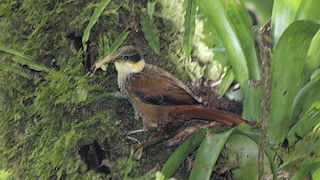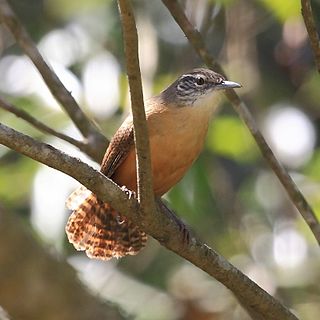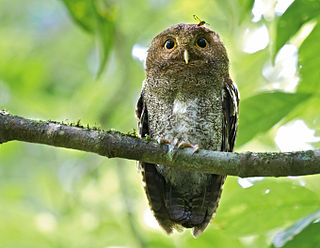
The russet-throated puffbird is a species of near-passerine bird in the family Bucconidae, the puffbirds, nunlets, and nunbirds. It is found in Colombia and Venezuela.

The buffy tuftedcheek or Lawrence's tuftedcheek is a passerine bird in the Furnariinae subfamily of the ovenbird family Furnariidae. It is found in Costa Rica and Panama.

The grass wren is a species of passerine bird in the family Troglodytidae. It is widely distributed in central and southern America.

Chapman's swift is a species of bird in subfamily Apodinae of the swift family Apodidae. It is found in Bolivia, Brazil, Colombia, French Guiana, Guyana, Panama, Peru, Suriname, Trinidad, Venezuela, and possibly Ecuador.

The Colombian crake is a species of bird in the subfamily Rallinae of the rail, crake, and coot family Rallidae. It is found in Colombia, Ecuador, and Panama.

The sepia-brown wren or Sharpe's wren is a species of bird in the family Troglodytidae. It is found in Colombia, Ecuador, and Peru.

The chestnut-breasted wren is a species of bird in the family Troglodytidae. It is found in Colombia, Ecuador, Peru and Bolivia.

The tawny-faced gnatwren or half-collared gnatwren is a species of bird in the family Polioptilidae, the gnatcatchers. It is found in Bolivia, Colombia, Costa Rica, Ecuador, Nicaragua, Panama, and Peru.

The grey-throated leaftosser is a Near Threatened species of bird in the subfamily Sclerurinae, the leaftossers and miners, of the ovenbird family Furnariidae. It is found in Bolivia, Brazil, Colombia, Costa Rica, Ecuador, Panama, Peru, Trinidad and Tobago, and Venezuela.

The timberline wren is a species of bird in the family Troglodytidae. It is found in Costa Rica and western Panama.

The buff-breasted wren is a species of bird in the family Troglodytidae. It is found in the Amazon Basin of northern Brazil and Amazonian Colombia, Ecuador, Peru and northern-border Bolivia, and also the Guianan countries of Guyana, Suriname, and French Guiana. It occurs in non-Amazonian regions of Venezuela and Colombia and its range extends into eastern Panama.

The bay wren is a species of bird in the family Troglodytidae. It is native to southern Central America and northwestern South America.

The speckle-breasted wren is a species of bird in the family Troglodytidae. It is found in Colombia, Ecuador, and Peru.

The sooty-headed wren is a species of bird in the family Troglodytidae. It is found in Colombia and Panama.

The Chocó screech owl is a species of owl in the family Strigidae. It is found from central Panama to western Ecuador.

The vermiculated screech owl, is a subspecies, or possibly separate species, of owl in the family Strigidae. It is found in Costa Rica, Nicaragua, and Panama.

The Pacific tuftedcheek is a passerine bird in the Furnariinae subfamily of the ovenbird family Furnariidae. It is found in Colombia and Ecuador.

The isthmian wren is a species of bird in the family Troglodytidae. It is found in Costa Rica and Panama.

The white-throated toucanet or greyish-throated toucanet is a near-passerine bird in the toucan family Ramphastidae. It is found in Colombia, Ecuador, and Venezuela.

The Veracruz wren is a songbird of the family Troglodytidae. It is endemic to Mexico.























